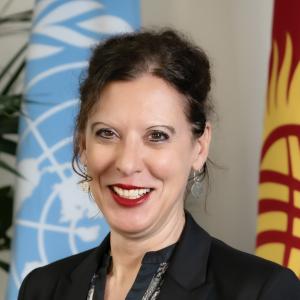Antje Grawe speech on Global Mountain Dialogue for Sustainable Development / Towards the Summit Bishkek+25
24 April 2025, Bishkek, State Residence “Ala-Archa-1
Excellencies,
Distinguished Guests,
Dear colleagues,
I am honored to address you today at the Global Mountain Dialogue for Sustainable Development, and it is an even greater honor to speak on behalf of the United Nations Deputy Secretary-General, Ms. Amina J. Mohammed, who conveys her warmest greetings to the Kyrgyz Government and her strongest support for this gathering and Kyrgyzstan’s mountain initiative.
This Dialogue convenes in the heart of Central Asia—a region where mountains are not merely a landscape, but a lifeline. Globally, mountain regions cover 27 percent of the Earth’s land surface and are home to over 1.1 billion people. These regions provide essential services—water, food, biodiversity, renewable energy, and cultural heritage—not only for those who live there, but for billions more downstream. Yet mountain communities remain among the most vulnerable, facing the brunt of climate change, food insecurity, natural hazards, and limited access to essential services.
This is why the United Nations has long recognized the importance of sustainable mountain development, thanks in large part to the advocacy of the Kyrgyz Republic and other mountain nations, assembled here today. The UN General Assembly’s adoption of the Resolution in December 2022, proclaiming 2023–2027 as the Five Years of Action for the Development of Mountain Regions, reaffirmed the world’s shared commitment to pay special attention to mountain regions and its communities. As the 2025 Report on Sustainable Mountain Development of the Secretary-General to the 80th General Assembly is being prepared, recommendations on scaling up nature-based solutions, improving services and infrastructure, strengthening international cooperation, increasing investment, and empowering women, youth, Indigenous Peoples, and local communities are needed, and we look forward to receiving practical recommendations from this gathering.
At the global level, the UN is supporting mountain development on multiple fronts—from advancing resilient livelihoods, to inclusive food systems and innovative practices. With a wide range of partners, we also help develop sustainable value chains, protect biodiversity and preserve cultural and Indigenous knowledge.
But mountains do not exist in isolation. Global and regional cooperation is essential. I encourage all participants to strengthen joint action and knowledge sharing across borders. Here, Central Asia offers powerful examples: regional initiatives for glacier monitoring, climate data exchange, and disaster preparedness are already under way—from artificial glaciers in Batken and Naryn, to electronic water monitoring systems, benefiting neighboring countries.
The climate crisis adds urgency to this cooperation. The International Year of Glaciers’ Preservation in 2025, initiated by Tajikistan, underscores the risks from glacier retreat to water security and biodiversity. The launch of the UNFCCC’s Expert Dialogue on Mountains and Climate Change within the COP framework—an initiative propelled by Kyrgyzstan—was in this regard a pivotal step forward.
In this broader context, let me highlight three commitments from the Pact for the Future, adopted by world leaders at the 2024 Summit of the Future in New York, which offer a powerful framework for mountain action. First, the Pact calls for urgent implementation of the 2030 Agenda and prioritizes the needs of those living in remote and fragile ecosystems. Second, it urges a dramatic scale-up of adaptation finance for climate-vulnerable communities. And third, it emphasizes nature-based solutions and the protection of ecosystems as central to our collective climate response. These principles resonate deeply with the realities of mountain regions.
Dear participants, allow me to speak for a moment now as the United Nations Resident Coordinator in the Kyrgyz Republic.
In Kyrgyzstan, the Mountain Agenda is not abstract—it is part of everyday life. The country has led the way globally: from championing the International Year of Mountains in 2002 to initiating the 2022 General Assembly resolution that launched the 2023-2027 Five Years of Action.
Therefore, the UN family in Kyrgyzstan is proud to have supported today’s Dialogue in close partnership with national authorities and with development partners. But our engagement extends well beyond this event.
Together, we are advancing community-level action: from climate-smart agriculture and women-led green enterprises to improved disaster preparedness. We have helped expand mobile health services and telemedicine in remote areas, supported AI-powered glacier monitoring, and promoted skills training and entrepreneurship for youth and returning migrants. We also continue to support regional approaches—working across borders on water management, climate adaptation, and risk reduction. I hope that these efforts can be further scaled and institutionalized with support from Kyrgyzstan’s partners so that mountain communities can thrive in a protected ecosystem.
Ladies and Gentlemen, let me now return to speaking on behalf of the Deputy Secretary-General.
Mountain peoples are protectors of biodiversity, innovators of resilience, and keepers of ancient knowledge. Their efforts must be matched by inclusive policies, targeted investment, and data systems that reflect their realities. We need meaningful participation of Indigenous and local voices in decision-making, and more gender-responsive, as well as youth-driven approaches.
This Global Mountain Dialogue is more than a milestone—it is a message. A message that mountain voices are being heard, and that the international community is ready to act in solidarity. The naming of one of the majestic peaks of Kyrgyzstan’s mountains after the United Nations on the occasion of the UN Secretary General’s visit to the country last year stands for this call.
Let us rise to this occasion. When mountain communities are strong, the world is stronger. When we protect the peaks, we safeguard the planet. And when we uplift those who live at the top of the world, we elevate all of humanity.
Thank you.
Speech by





